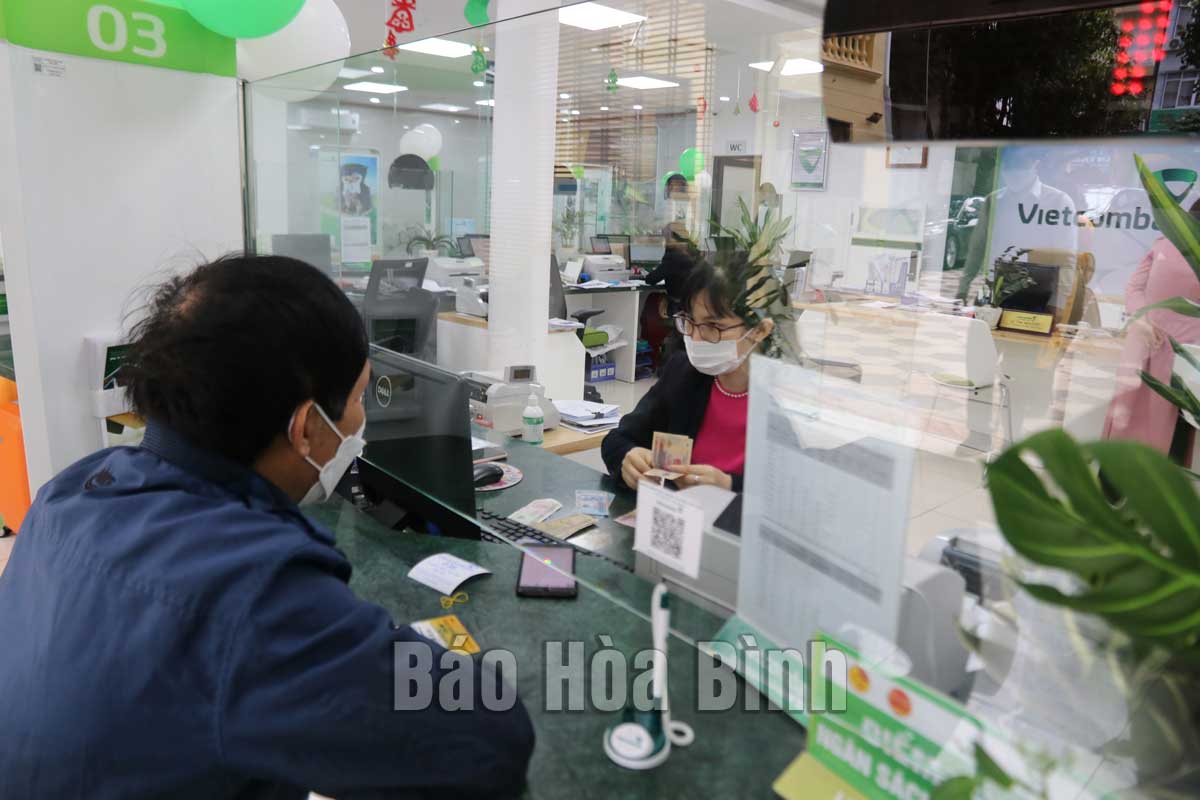
(HBO) – Since the start of this year, the State Bank of Vietnam (SBV)’s Branch in Hoa Binh province has actively implemented guidelines and policies of the Party, State and sectors for banks and credit institutions in the province, with focus placed on providing preferential credit to people and businesses hurt by the COVID-19 pandemic and expanding non-cash payment from 2022 – 2025.

Vietcombank’s branch
in Hoa Binh contributes to effectively boosting the local economic development.
Reports showed that Hoa Binh’s monetary market
remained fairly stable this year, with total capital mobilized by the end of
May totaling 35.55 trillion VND, up 6 percent from the end of last year. Over
28.13 trillion VND of which came from businesses and individuals, an increase
of 8 percent from the end of 2021.
According to statistics from the SBV Branch in
Hoa Binh, total outstanding loans in agriculture and rural development exceeded
15.78 trillion VND as of the end of May, accounting for 51 percent of the
total. Soft loans for small- and medium-sized enterprises reached over 7.03
trillion VND, making up 22.7 percent of the total; and that for exports and
supporting industry valued 22 billion VND.
In the coming time, Ngo Quang Loi, Deputy
Director of the SBV Branch in Hoa Binh, said it will continue focusing on
enforcing the State and Party’s related guidelines and policies, particularly
financial support packages under the government’s post-pandemic recovery
programme; and accelerate inspection over banks and credit institutions and
anti-corruption efforts.
It will also closely control credit provision in
high-risk sectors, such as investment, real estate, securities, BOT and BT
transport projects, and corporate bonds; and strictly monitor credit poured
into land use right auctions under the direction of the State Bank of Vietnam.
The SBV Branch has been urging the continued
provision of support for pandemic-hit enterprises to push for economic recovery
and the effective implementation of policy credit programmes, particularly for
the poor and policy beneficiaries. It also plans to promote digital transformation
and cashless payment over the next three years./.
According to data from the Hoa Binh Provincial Party Committee, the industrial production index for the first six months of 2025 is estimated to have increased by 20% compared to the same period last year. This marks the highest year-on-year growth rate for this period since 2020.
In the first six months of 2025, Hoa Binh province’s export turnover was estimated at 1.145 billion USD, marking an 18.11% increase compared to the same period in 2024. Import turnover was estimated at $ 804 million, a 17.15% increase, which helped the province maintain a positive trade balance.
The lives of the ethnic minority farmers in Tan Lac district have gradually improved thanks to the new directions in agricultural production. This is a testament to the collective strength fostered through the professional associations and groups implemented by various levels of the district’s Farmers’ Union.
With the motto the "product quality comes first,” after nearly one year of establishment and operation, Muong village’s Clean Food Agricultural and Commercial Cooperative, located in Cau Hamlet, Hung Son Commune (Kim Boi district), has launched reputable, high-quality agricultural products to the market that are well-received by consumers. The products such as Muong village’s pork sausage, salt-cured chicken, and salt-cured pork hocks have gradually carved out a place in the market and they are on the path to obtaining the OCOP certification.
In the past, the phrase "bumper harvest, rock-bottom prices" was a familiar refrain for Vietnamese farmers engaged in fragmented, small-scale agriculture. But today, a new spirit is emerging across rural areas of Hoa Binh province - one of collaboration, organisation, and collective economic models that provide a stable foundation for production.
Maintaining growing area codes and packing facility codes in accordance with regulations is a mandatory requirement for agricultural products to be eligible for export. Recently, the Department of Agriculture and Environment of Hoa Binh province has intensified technical supervision of designated farming areas and packing facilities to safeguard the "green passport" that enables its products to access international markets.



